英语听力文章:转折
英语听力短文的听力技巧
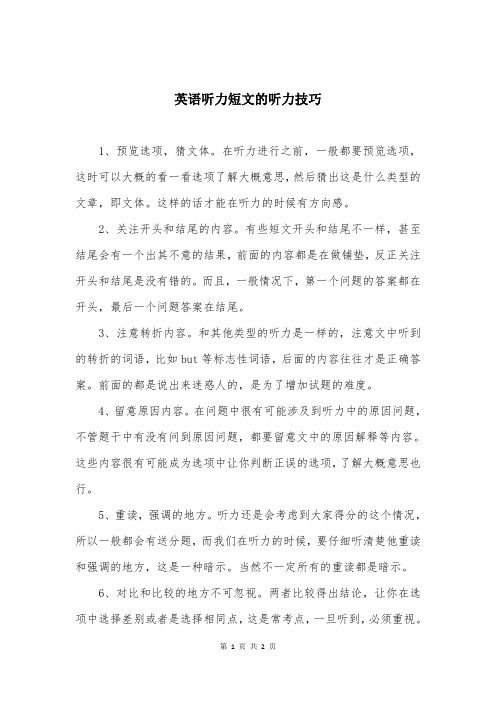
英语听力短文的听力技巧
1、预览选项,猜文体。
在听力进行之前,一般都要预览选项,这时可以大概的看一看选项了解大概意思,然后猜出这是什么类型的文章,即文体。
这样的话才能在听力的时候有方向感。
2、关注开头和结尾的内容。
有些短文开头和结尾不一样,甚至结尾会有一个出其不意的结果,前面的内容都是在做铺垫,反正关注开头和结尾是没有错的。
而且,一般情况下,第一个问题的答案都在开头,最后一个问题答案在结尾。
3、注意转折内容。
和其他类型的听力是一样的,注意文中听到的转折的词语,比如but等标志性词语,后面的内容往往才是正确答案。
前面的都是说出来迷惑人的,是为了增加试题的难度。
4、留意原因内容。
在问题中很有可能涉及到听力中的原因问题,不管题干中有没有问到原因问题,都要留意文中的原因解释等内容。
这些内容很有可能成为选项中让你判断正误的选项,了解大概意思也行。
5、重读,强调的地方。
听力还是会考虑到大家得分的这个情况,所以一般都会有送分题,而我们在听力的时候,要仔细听清楚他重读和强调的地方,这是一种暗示。
当然不一定所有的重读都是暗示。
6、对比和比较的地方不可忽视。
两者比较得出结论,让你在选项中选择差别或者是选择相同点,这是常考点,一旦听到,必须重视。
第 1 页共2 页
两个物体或者人的各种特征要分清楚,不要混乱了。
7、梳理短文主干。
短文有些是介绍一个人,一个故事,或者是一则新闻材料,在听文章的时候,可以根据听到的内容,简单的将主干内容或者文章的思路记下来,以便对后面的有些没有理解的地方加以揣测。
第 2 页共2 页。
托福听力lecture常见三大结构

托福听力lecture常见三大结构托福听力段落比较长,涉及到的话题也多种多样,不过,我们可以从托福听力段落的结构方面找到一些技巧,来更准确的把握托福听力的意思。
店铺为您整理“托福听力lecture常见三大结构”,希望对您有所帮助。
托福听力lecture常见三大结构托福听力段子一般分3段,第一段点题,也就是提出问题;第二段讨论,也就是展开问题的各分点。
第三段结轮,也就是经过讨论后下结论。
第一、三部分都比较好说,一头一尾嘛,容易把握。
而主要的主要针对的是文章的讨论部分,它会分几点来叙述将要说明的事情,而这几点又是由某些顺序来组织的:我们认为托福听力段落的结构通常有3类:1. 时间顺序。
在叙说一个事物史的发展的时候,通常是采取时间渐进的方式来叙述。
先怎么样,再怎么样,最后怎么样。
2. 空间顺序。
在介绍一个事物的时候,也会采用空间移动的顺序。
里面怎么样,外面怎么样,前面怎么样,后面怎么样,上面怎么样,下面怎么样。
3. 好坏顺序。
在介绍新产品的时候,往往会先说它的几个优点,然后再说它缺点。
在介绍某种现象的时候,也会先说它带来的好处,再说它的坏处。
注意:对于分类,也许还不太完善。
也许不太合理,也许还有其他的遗漏。
而且有的时候,文章通常会是两种顺序交叉或者交替进行。
其实不管怎么样分,听的过程中主要是听清分点和结构,提供的这些顺序,只是帮助大家记忆的。
我们在听文章的时候就得抓住如上重点,听完后得知道文章说了哪几点,是采取什么顺序来组织的。
当听出托福听力文章的结构来后,我们自然能把握好文章的主题,这样TOPIC题和尾巴题就不在话下了,而对于做细节题,也同样非常有帮助的。
因为大家知道,TOEFL是顺序出题的,了解了结构,对于第几题对应那个段,自然是非常清楚。
托福听力科学60秒(SSS)原文之丝绸之路对很多备战托福听力的伙伴来说,著名的科学60秒(sixty-second science,简写为SSS)一定不陌生。
SSS只有一分钟,但是语速快,信息量大。
湖北高考英语听力试音中文经典
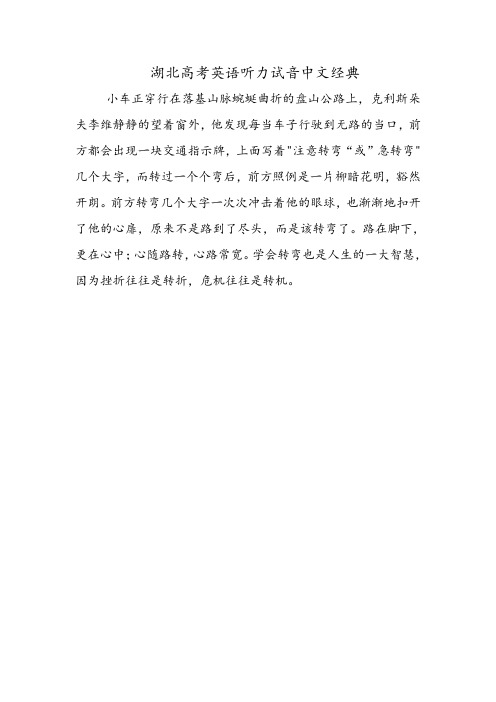
湖北高考英语听力试音中文经典
小车正穿行在落基山脉蜿蜒曲折的盘山公路上,克利斯朵夫李维静静的望着窗外,他发现每当车子行驶到无路的当口,前方都会出现一块交通指示牌,上面写着"注意转弯“或”急转弯"几个大字,而转过一个个弯后,前方照例是一片柳暗花明,豁然开朗。
前方转弯几个大字一次次冲击着他的眼球,也渐渐地扣开了他的心扉,原来不是路到了尽头,而是该转弯了。
路在脚下,更在心中;心随路转,心路常宽。
学会转弯也是人生的一大智慧,因为挫折往往是转折,危机往往是转机。
雅思英语听力方法技巧

雅思英语听力方法技巧学习外语并不难,普及教育就像交朋友一样,朋友是越交越熟的,天天见面,朋友之间就亲密无间了。
重复重复再重复,熟练熟练再熟练,是学会英语的不二法门。
下面是给大家整理的一些雅思英语听力的方法技巧,希望对大家有所鼓励。
数理化听力考试解题技巧一、点对点时注意信号词1、在做听力题目时,我们首先预读题目。
在读题目的过程中,我们可以预判听力材料的内容。
2、定位:信号词(Signals)可以暗中帮助我们定位,提示答案的到来,或答案就在信号词附近。
3、同义替换:正确选项(Answers)在听力原文中可能被同义替换,以增加题目的难度系数,建议考生注重理解出处的整体意思,而但非纠结于个别单词。
4、排除干扰:干扰选项(Distractors)往往保留听力原文中容易被考生捕捉到的原词,无法诱骗只能听懂个别短语而无法理解整体意思的考生。
可能你会经常遇上这样的情况,忽然有一个题目没有听清楚,这时候千万不要慌张,也切忌在此逗留太久,而是应该把你听到的零星的信息随便写一点在题目,接着马上转到下一题。
等大多数听力做完了,回头答案的时候再根据你记录到的一点信息分析正确答案是什么。
假如在该题上可能会导致错过后面的题目信息。
二、注重表示“转折”的信息雅思听力很狡猾的,经常前面说了一个答案,后面又马上改口,所以一定留意 but、however 这些词,或者有时候先说一种方案,然后马上又说probably it is better to … 那么答案又前边变成后面这个了。
三、图表类题目的解题要领1、观察“指向标”:观察图中是否有“指向标”,若有,则说话人会用“东南西北”来指明方向;若没有,则说话人可能会用“上下左右前后”来指明方向。
2、明确说话人的位置或旅途的起始点。
3、明确道路走向:(1)若图中标明了道路走向,则听力内容出现的顺序发生与问题出现的顺序是完全一致的,而图中明确标明干道的道路走向,与听力内容出现的顺序一致,所以,明确道路走向,能够能够帮助我们有条不紊地解答题目。
2019年12月英语六级听力真题详解

2019年12月英语六级听力真题详解conversation 1Hey I just read a great book about physics。
I thinkyou‘d like it。
It’scalled the physics of the world。
It‘s written by ascientist named SylviaMendez。
Oh I read that book。
It was great。
The writer is a warm and competent guideto the mysteries of physics。
【1】 I think it promises enrichment for any readerfrom those who know little about science to the career physicist。
And it‘s refreshing tosee【2】a strong curious clever woman adding her voiceto the scientific discourse and a field that has been traditionally dominated bymen。
I think she has to be commended for making an effort to include anecdotesabout little known female scientists。
You know they were often victims of ageneration firmly convinced that the woman’s place was in the home。
【3】I like how the book is clearly written with each chapter brought to lifeby pieces of fascinating knowledge。
英语四级听力短文应试技巧

c) 针对内在含义提问/推断题 What can you infer / not infer from the passage﹖ What does the passage mainly suggest﹖
2、抢读选项,预测文章内容&问题。 3、听清主题句,把握文章的主题思想。第一 句、第二句和最后一句 4、 边听边记,抓住关键信息。 段落理解的重要任务是确定关键句和关键信 息,凡是在选项中重复到的原句都应当做标 记; 文中反复出现同一单词或同一类单词,也值得 注意,包含与这类单词的选项能较好的体现中 心,通常是正确答案
四级辅导—— 听力短文
记叙文:主要包括新闻、故事、人物传记 等 考查的细节题较多 注意关键信息,如时间、地点、人物、原 因,以及人物传记中对人物有重大意义的 事件 考生应快速浏览选项,推测出短文的大致 内容,听录音时把注意力集中在关键信息 上。
说明文:主要包括文化教育类、社会制度类和 科普研究类文章。 由于说明文所涉及的内容相当广泛,考生应注意平 时多阅读、多积累,扩大自己的知识面,尤 其要注意西方文化与本国文化不同的地方,以及科 学技术的新发展、新变化。 文化教育类和社会制度类短文虽然题材广泛,内容 通俗易懂,句型结构较简单。 可通过篇首或篇尾的主题句推测文章内容。 科普研究类文章往往是考生比较陌生的话题,句型 结构较复杂,也会经常出现生僻词。 但是此类文章的题目一般都较简单,细节题较多, 考生可边听边看题目选项,捕获关键信息,放 弃无关紧要的信息和听不明白的词。
文议论 听时注意作者的观点 态度以及支撑其观点所 列举的事实和数据。 主题句一般在段首或段 尾 设置的问题多是主旨大 意题和造成现象问题的 原因类题。
There is always a BUT学生学案(教师版)

There is always a BUT ——英语听力中的转折Bad BUTs : 反向引导转折——干扰答题误导学生选择________答案Good BUTs : 正向引导转折——引出答题信息 直接信息:直接指向__________间接信息:a. ________计算calculations b. ________或________synonyms and antonymsc. 关联话题词进行________ inferences三、应对听力转折的建议和方法1. 审题时遇到与数字有关的问题如__________________等通常都会设置转折信息。
2. 转折信息大部分指向正确答案,但也有可能会__________答题,所以要仔细辨别,必要时要做好笔记。
3.审题时注意题目的时态,听题时注意通过__________以及____________的变化体现的转折。
四、巩固训练1.What does the woman think of the movie? (2017全国卷1第1题)A.It’s amusing.B. It’s excitingC. It’s disappointing.2.What will the woman do this afternoon? (2017全国卷2第1题)A.Do some exerciseB. Go shoppingC. Wash her clothes3.When will Judy go to a party? (2018全国卷2第6题)A. On MondayB. On TuesdayC. On Wednesday五、角色转换:假设你是出题人,请利用所给听力材料中的转折信息设计一道题目:Question:_____________________________________________________________ Choices: A. _______________________B.________________________C.________________________听力材料1:W: I’ll see you at the theatre.M: Better stil l, let’s meet in the Red Lion Bar to have a nice little talk.W: Good idea. And I’d love to have a drink there.听力材料2:M: I’m tired of travelling all those hours to work.W: Yeah. I know what you mean. I used to drive two hours to work each way. But now I live within walking distance from my office. I don’t even need a bike.。
四级英语听力的模式及应试技巧剖析
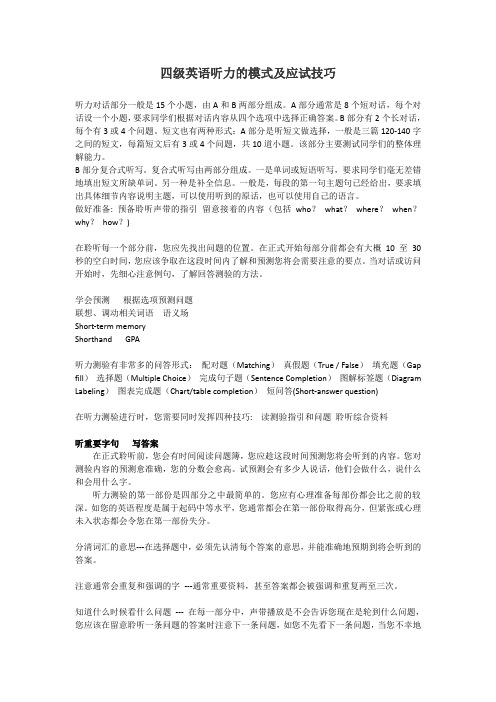
四级英语听力的模式及应试技巧听力对话部分一般是15个小题,由A和B两部分组成。
A部分通常是8个短对话,每个对话设一个小题,要求同学们根据对话内容从四个选项中选择正确答案。
B部分有2个长对话,每个有3或4个问题。
短文也有两种形式:A部分是听短文做选择,一般是三篇120-140字之间的短文,每篇短文后有3或4个问题,共10道小题。
该部分主要测试同学们的整体理解能力。
B部分复合式听写。
复合式听写由两部分组成。
一是单词或短语听写,要求同学们毫无差错地填出短文所缺单词。
另一种是补全信息。
一般是,每段的第一句主题句已经给出,要求填出具体细节内容说明主题,可以使用听到的原话,也可以使用自己的语言。
做好准备: 预备聆听声带的指引留意接着的内容(包括who?what?where?when?why?how?)在聆听每一个部分前,您应先找出问题的位置。
在正式开始每部分前都会有大概10至30秒的空白时间,您应该争取在这段时间内了解和预测您将会需要注意的要点。
当对话或访问开始时,先细心注意例句,了解回答测验的方法。
学会预测根据选项预测问题联想、调动相关词语语义场Short-term memoryShorthand GPA听力测验有非常多的问答形式:配对题(Matching)真假题(True / False)填充题(Gap fill)选择题(Multiple Choice)完成句子题(Sentence Completion)图解标签题(Diagram Labeling)图表完成题(Chart/table completion)短问答(Short-answer question)在听力测验进行时,您需要同时发挥四种技巧: 读测验指引和问题聆听综合资料听重要字句写答案在正式聆听前,您会有时间阅读问题簿,您应趁这段时间预测您将会听到的内容。
您对测验内容的预测愈准确,您的分数会愈高。
试预测会有多少人说话,他们会做什么,说什么和会用什么字。
雅思听力考试技巧之4步精听法

雅思听力考试技巧之4步精听法雅思听力考试技巧之4步精听法,我今日给大家带来了雅思听力考试技巧之4步精听法,盼望能够关心到大家,下面我就和大家共享,来观赏一下吧。
雅思听力考试技巧之4步精听法雅思听力第一遍全文听过,着重理解文章内容,在听的过程中不要看原文,肯定有很多单词听不出来,甚至有些句子也没有听出来,没有关系,开头其次遍。
雅思听力其次遍这次重点放在听懂句子上,试着依据听到的单词和结构猜想没有听到部分的内容,依据其发音特点估量究竟是哪个单词,这时大家会发觉听力测试其实是考察一个人的记忆力的测试,必需以最快的速度记住听懂的内容,而这并不是最难的;还要尽可能记住没听懂的内容,依据上下文和发音特点来猜想记忆,在脑海中依据听力内容的进程设置提示点,提示的越明确,以后回忆起来的可能性就越大。
雅思听力第三遍在听的过程中反复搜寻刚才设置的各个提示点,连续联系上下文,重点放在单词的理解上,由全文,到句子,再到单词,范围渐渐缩小,假如基础比较好的话,会发觉听第三遍时单词会自己跳到脑海中,这是由于大脑对听到的信息已经进行了2次加工,依据设置的提示点会使人想起以前记忆库中的单词。
听过三遍后,再看一遍原文,快速的看,只看自己没听出来的部分,这样记忆会特别深刻。
雅思听力第四遍重听刚才的内容,留意语音语调,从语音的角度加强刚才没听出来内容的记忆。
这样,经过四次精听,基础好、记忆力好的同学可能已经把文章背的差不多了!每天听1个小时,坚持听1-2个月后,一般难度的听力材料已经可以听懂了,由于全部听力资料的发音规章都是一样的,接触的材料多了,各种发音规章都见过了,而且有的不只听过一次,这样对听力规章的把握就基本完成了。
经过不断的学习和巩固提高,听力水平会在原有的基础上达到一个新的高度。
雅思听力考试技巧:细心、信号词、心态雅思听力考试技巧一、细心其实有不少同学的英语听力力量都是很强的,但是他们在最终却拿不了高分,主要就是由于习惯他们了马大哈的状态。
研究生英语听力考试原文
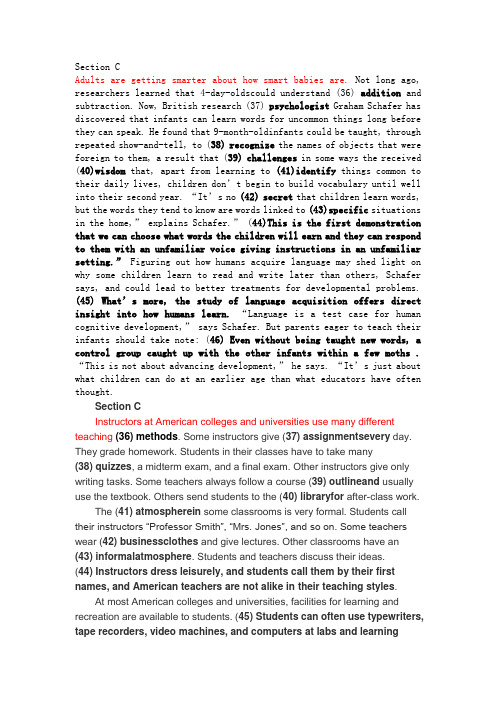
Section CAdults are getting smarter about how smart babies are. Not long ago, researchers learned that 4-day-oldscould understand (36) addition and subtraction. Now, British research (37) psychologist Graham Schafer has discovered that infants can learn words for uncommon things long before they can speak. He found that 9-month-oldinfants could be taught, through repeated show-and-tell, to (38) recognize the names of objects that were foreign to them, a result that (39) challenges in some ways the received (40)wisdom that, apart from learning to (41)identify things common to their daily lives, children don’t begin to build vocabulary until well into their second year. “It’s no (42) secret that children learn words, but the words they tend to know are words linked to (43)specific situations in the home,” explains Schafer.” (44)This is the first demonstration that we can choose what words the children will earn and they can respond to them with an unfamiliar voice giving instructions in an unfamiliar setting.” Figuring out how humans acquire language may shed light on why some children learn to read and write later than others, Schafer says, and could lead to better treatments for developmental problems.(45) What’s more, the study of language acquisition offer s direct insight into how humans learn.“Language is a test case for human cognitive development,” says Schafer. But parents eager to teach their infants should take note: (46) Even without being taught new words, a control group caught up with the other infants within a few moths .“This is not about advancing development,” he says. “It’s just about what children can do at an earlier age than what educators have often thought.Section CInstructors at American colleges and universities use many different teaching (36) methods. Some instructors give (37) assignmentsevery day. They grade homework. Students in their classes have to take many(38) quizzes, a midterm exam, and a final exam. Other instructors give only writing tasks. Some teachers always follow a course (39) outlineand usually use the textbook. Others send students to the (40) libraryfor after-class work.The (41) atmospherein some classrooms is very formal. Students call their instructors “Professor Smith”, “Mrs. Jones”, and so on. Some teachers wear (42) businessclothes and give lectures. Other classrooms have an(43) informalatmosphere. Students and teachers discuss their ideas.(44) Instructors dress leisurely, and students call them by their first names, and American teachers are not alike in their teaching styles.At most American colleges and universities, facilities for learning and recreation are available to students. (45) Students can often use typewriters, tape recorders, video machines, and computers at labs and learningcentres. They can buy books, notebooks, and other things at campus stores.(46) They can get advice on their problems from counselors and individual help with their classes from tutors. Students can relax and have fun on campus, too. Some schools have swimming pools and tennis courts. Most have snack bars or cafeterias.高分范文Water used to be mistaken to be an unlimited and renewable resource. Actually, water resource is very limited and precious. It is fortunate that now the public is starting to pay attention①. Just as is depicted in the picture, just like saving money, the lovely and smiling piggy bank is collecting every drop of water falling from the water tap。
2015年6月英语六级听力原文及答案
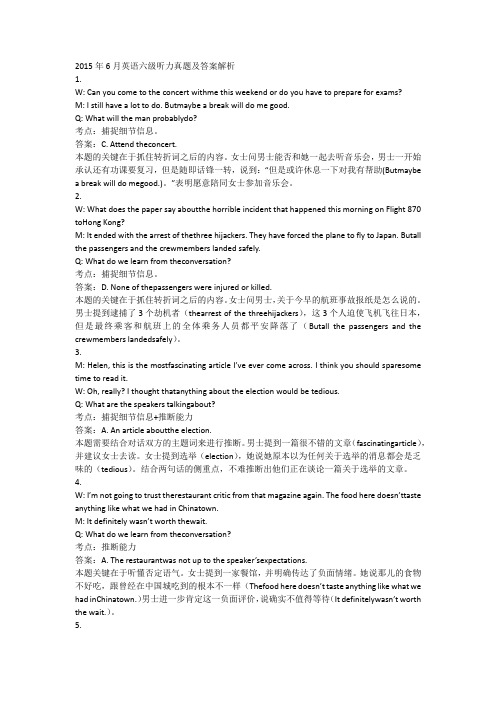
2015年6月英语六级听力真题及答案解析1.W: Can you come to the concert withme this weekend or do you have to prepare for exams?M: I still have a lot to do. Butmaybe a break will do me good.Q: What will the man probablydo?考点:捕捉细节信息。
答案:C. Attend theconcert.本题的关键在于抓住转折词之后的内容。
女士问男士能否和她一起去听音乐会,男士一开始承认还有功课要复习,但是随即话锋一转,说到:“但是或许休息一下对我有帮助(Butmaybea break will do megood.)。
”表明愿意陪同女士参加音乐会。
2.W: What does the paper say aboutthe horrible incident that happened this morning on Flight 870 toHong Kong?M: It ended with the arrest of thethree hijackers. They have forced the plane to fly to Japan. Butall the passengers and the crewmembers landed safely.Q: What do we learn from theconversation?考点:捕捉细节信息。
答案:D. None of thepassengers were injured or killed.本题的关键在于抓住转折词之后的内容。
女士问男士,关于今早的航班事故报纸是怎么说的。
男士提到逮捕了3个劫机者(thearrest of the threehijackers),这3个人迫使飞机飞往日本,但是最终乘客和航班上的全体乘务人员都平安降落了(Butall the passengers and the crewmembers landedsafely)。
关于大学英语四级听力SectionC短文篇章提分技巧及答题步骤大解读
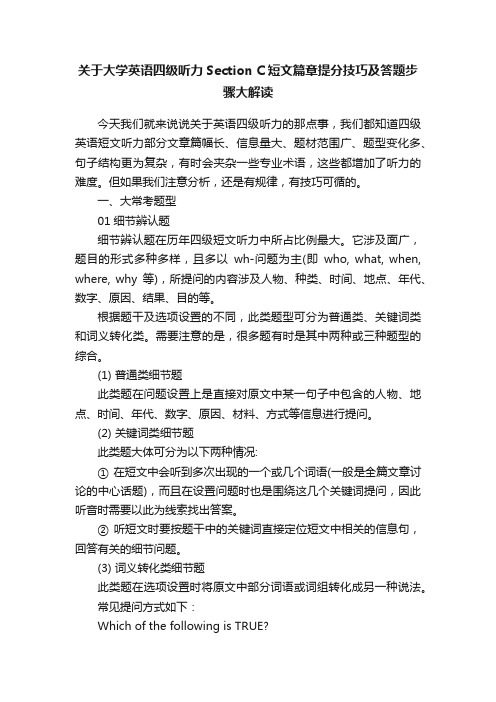
关于大学英语四级听力Section C短文篇章提分技巧及答题步骤大解读今天我们就来说说关于英语四级听力的那点事,我们都知道四级英语短文听力部分文章篇幅长、信息量大、题材范围广、题型变化多、句子结构更为复杂,有时会夹杂一些专业术语,这些都增加了听力的难度。
但如果我们注意分析,还是有规律,有技巧可循的。
一、大常考题型01细节辨认题细节辨认题在历年四级短文听力中所占比例最大。
它涉及面广,题目的形式多种多样,且多以wh-问题为主(即who, what, when, where, why等),所提问的内容涉及人物、种类、时间、地点、年代、数字、原因、结果、目的等。
根据题干及选项设置的不同,此类题型可分为普通类、关键词类和词义转化类。
需要注意的是,很多题有时是其中两种或三种题型的综合。
(1) 普通类细节题此类题在问题设置上是直接对原文中某一句子中包含的人物、地点、时间、年代、数字、原因、材料、方式等信息进行提问。
(2) 关键词类细节题此类题大体可分为以下两种情况:① 在短文中会听到多次出现的一个或几个词语(一般是全篇文章讨论的中心话题),而且在设置问题时也是围绕这几个关键词提问,因此听音时需要以此为线索找出答案。
② 听短文时要按题干中的关键词直接定位短文中相关的信息句,回答有关的细节问题。
(3) 词义转化类细节题此类题在选项设置时将原文中部分词语或词组转化成另一种说法。
常见提问方式如下:Which of the following is TRUE?When was the first…probably made?Why did the speaker say…?02主旨大意题主旨大意题一般要求考生根据录音信息归纳出短文的主题或中心思想等。
主旨即短文的中心思想,它通常是以主题句的形式出现在短文中。
准确把握主题句是解答主旨题的关键。
由于短文听力的篇幅较长,提供的信息较多,因此在听短文之前先看选项有助于加深对短文主题的理解,同时也可以帮助考生预测题目。
《英语四级听力》PPT课件

2.4.4 the last =the least likely
Eg: He is the last person to do the thing. 2.4.5 not the less=none the less→同样、也
2 具备基本技能
2.1 积累习惯用语与表达
习语:
at the top of the ladder/tree 名列前茅
back out
食言;变卦
beyond (all) question 毫无疑问;无可争辨
bird in the bush
未到手的东西,未定局的事情
booked up
没空;有约会;
(戏票等)已被预定一空
need have done 2.2.9 Anything but和before(动词)表示否定意义
You mother bears anything but receiving the news. 听到这个消息,你母亲会受不了的。 2.2.10 too…to…与too…for… You are driving too fast for safety. 你开车太到心中有数 2.5.1 人物关系 (key words, key phrases) (1)教师与学生(Teacher and student) (2)学生与学生(Classmates/roommates/schoolmates) (3)图书管理员与学生(Librarian and student) (4)营业员与顾客(Shop assistant and customer/shopper) (5)饭店侍者与顾客(Waiter/waitress and customer) (6)医生与病人(Doctor and patient) (7)出租车司机与乘客(Taxi driver and passenger)
四级英语转折词

距离12月份的四、六级考试还有一个多月的时间,对于很多备考的同学来说,听力部分一直是个令人头痛的问题。
四、六级考试听力部分的短对话、长对话和短文听力其实考察的都是对听力材料的要点和信息的把握。
新东方在线网络课堂四、六级辅导团队大家总结了四、六级听力材料中的7种重要的关键词,这些词的后面一般都是考点,尤其是对话部分,要学会听小词,希望以下内容能给大家的听力备考提供帮助。
一、转折性词汇课堂上强调了很多的涵义发生180度转弯的BUT转折题,要学会听BUT,还有yet, however, though, whereas, unfortunately, unexpectedly, instead, rather than, other than, to be frank, frankly speaking, to tell you the truth,etc.二、逻辑类词汇就是因为所以不但而且这一类的词,表原因的because, because of, for, as, due to, owing to, in that, now that, according to, 表结果的therefor, so, as a result, consequently, eventually, 表递进的apart from, in addition, furthermore, what's more, moreover,etc.三、最高级词汇形容词和副词的最高级永远是最需要关注的,most importantly, the most popular... the biggest of...四、事实罗列词汇在这些词汇后就是关键和重要的事实性息,actually, in fact, as a matter of fact,etc.五、序数词后面最重要的是the first, firstly and finally.六、情态动词sb.has got to, can , could, may, might, need,should, ought to,etc.七、重要形容词表示重要的词,important, crucial, chief,major,significant, the only, unique, essential, necessary, vital, etc.来源:新东方在线。
2021年12月英语四级听力练习题及词汇
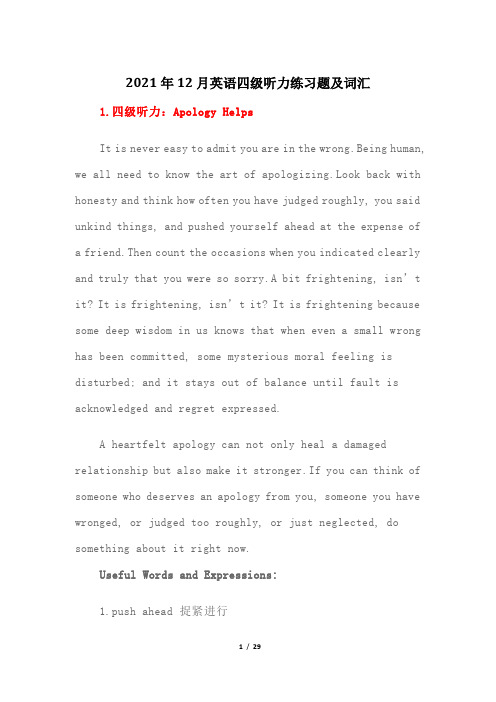
2021年12月英语四级听力练习题及词汇1.四级听力:Apology HelpsIt is never easy to admit you are in the wrong.Being human, we all need to know the art of apologizing.Look back with honesty and think how often you have judged roughly, you said unkind things, and pushed yourself ahead at the expense of a friend.Then count the occasions when you indicated clearly and truly that you were so sorry.A bit frightening, isn’t it? It is frightening, isn’t it? It is frightening because some deep wisdom in us knows that when even a small wrong has been committed, some mysterious moral feeling is disturbed; and it stays out of balance until fault is acknowledged and regret expressed.A heartfelt apology can not only heal a damaged relationship but also make it stronger.If you can think of someone who deserves an apology from you, someone you have wronged, or judged too roughly, or just neglected, do something about it right now.Useful Words and Expressions:1.push ahead 捉紧进行2.at the expense of 在损害……的情况下3.mysterious神秘的4.moral 道德的5.disturbed 扰乱的6.stay out of 不参与……,置身于……之外7.heartfelt 衷心的,真心真意的8.roughly粗糙地,概略地2.听力考试必考习语1、Both of the drivers were injured in the collision.(A)hindrance (B)cry (C)crash2、Janet’s job as an assistant at the Harvard University observatory was to classify stars according to their spectra.(A)locate (B)photograph (C)categorize3、In aerospace programs, helium(氦)is usedto chill rocket engines prior to the launch.(A)cool (B)fuel (C)test4、Ballet is theatrical entertainmentthat combines the arts of dancing, stage design, and music.(A)replaces (B)promotes (C)blends答案:CCAC详解:Crashn.撞碎;坠毁;破产;轰隆声;睡觉vi.摔碎;坠落;发出隆隆声;(金融企业等)破产vt.打碎;使坠毁、撞坏;擅自闯入He narrowly escaped in the air crash.他险些在飞机失事中遇难。
高中英语听力材料中的细节理解和推理

高中英语听力材料中的细节理解和推理在高中英语学习中,听力考试一直是学生们较为困惑的一项。
尤其是对于细节理解和推理题型,需要学生们通过听力材料得到准确的信息并进行合理的推断。
以下是一些关于高中英语听力材料中细节理解和推理的技巧和方法。
一、细节理解题的处理方法1. 仔细听细节理解题主要考察学生对听力材料中具体信息的捕捉能力。
因此,学生在听的过程中需要集中注意力,确保能够准确听到重要的细节信息。
2. 注意关键词在听力材料中,关键词往往能够帮助我们找到正确的答案。
关键词可能是地点、时间、人物或其他具体名词,学生们需要着重记忆这些关键词,以便在听完材料后可以快速找到答案。
3. 使用排除法如果在听力材料中找不到明确的答案,学生们也可以通过排除法来选择最有可能的选项。
通过分析其他选项与听力材料的不符之处,可以逐个排除,最终找到正确答案。
4. 切记不要盲目猜测在进行细节理解题时,学生们要避免盲目猜测答案。
尽管选项可能有些相似,但只有通过准确的听力材料才能确定答案,否则可能导致得分的丢失。
二、推理题的处理方法1. 理解上下文推理题需要学生根据听力材料中的暗示信息进行合理的推断。
在听力过程中,学生应该将注意力集中在与答案相关的信息上,理解上下文并进行逻辑推理。
2. 注意听力材料中的转折词转折词(例如:but, however, although等)能够帮助学生们找到答案的线索。
这些词常常用于表达对比、让步或转折关系,学生们应该对这些词敏感并且能够正确理解它们。
3. 利用已有知识推理题往往需要学生运用已有的知识进行推断。
通过将听力材料中的信息与所学知识进行联系,可以更好地进行推理,并选择最符合逻辑的答案。
4. 考虑可能有多个正确答案推理题中,有时候可能存在多个符合逻辑的答案。
在这种情况下,学生们需要根据听力材料给出的具体信息进行判断,并选择最有可能的答案。
综上所述,高中英语听力材料中的细节理解和推理要求学生们通过仔细听取和准确捕捉关键信息,并进行合理的推断。
- 1、下载文档前请自行甄别文档内容的完整性,平台不提供额外的编辑、内容补充、找答案等附加服务。
- 2、"仅部分预览"的文档,不可在线预览部分如存在完整性等问题,可反馈申请退款(可完整预览的文档不适用该条件!)。
- 3、如文档侵犯您的权益,请联系客服反馈,我们会尽快为您处理(人工客服工作时间:9:00-18:30)。
英语听力文章:转折
1.I was going to write you a letter,but I decided to call you instead.
2.Thank you for inviting us,but I don't believe that we will be able to make it.
3.The hat isn't mine but the coat is.
4.The State University team usually wins all of its games,but this year it lost two of them.
5.Jane usually comes to the ALI to meet her tutor,
6.Mike was planning to go to graduate school,but he
didn't have enough money.
7.Mrs.Baker was told that her illness was incurable,but she never gave up.
8.She doesn't like the dorm,but she does like her roommate.
9.The office is usually closed on Saturdays,but this week the secretary will be there until noon.
10.We ordered an egg salad sandwich,but the wait_ress brought us tuna fish instead.
11.The doctor isn't in right now,but he should be back shortly.
12.His visa expires in November,but the is eligible to get a three_month extension.
13.Our family ordinarily goes camping on vacation,but this year we're going to take a tour.
14.The food at the cafeteria is usually good,but last night it was awful.
15.It isn't normally necessary to have an appointment in order to see the foreign student advisor,but during registration it's a good idea to make one.
16.Cindy said that she could babysit any day but Friday.
17.I had just expected my daughter to come,but my son showed up too.
18.Bill wanted to buy some cologne for his wife's birthday,but the store didn't carry the brand she usually uses.
19.Apartments near the University are very expensive,but we decided to rent one anyway,thinking that we would save money on gas.
20.There are fifty students scheduled for language
lab ,but there are only forty-five booths.
21.Although you are feeling better,I think that you should still see a doctor.
22.Although the weather is bad,the roads are clear.
23.In spite of the problems,I doubt that Betty and Paul will get a divorce.
24.From his resume,this candidate appears to be well qualified for the job;even so,I think that we should check with his references.。
